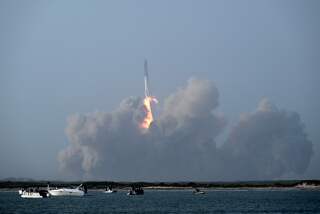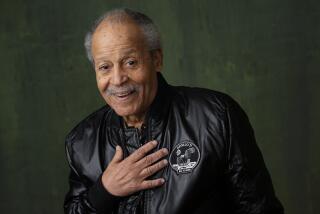Somber Reagan Pays Tribute to Crew Members : President Postpones State of Union Speech, Pledges to Continue Space Flights
- Share via
WASHINGTON — President Reagan, proclaiming it “a day for mourning and remembering,” postponed his State of the Union address Tuesday and instead went on national television to pay tribute to the crew of the shuttle Challenger and to pledge that there will be more shuttle flights as the United States continues its “quest in space.”
In seeking to console the nation and the families of the seven crew members, Reagan declared: “Nancy and I are pained to the core by the tragedy of the shuttle Challenger. We know we share this pain with all the people of our country. This is truly a national loss.”
And, in a poignant message to millions of schoolchildren who had been watching the launching because New Hampshire teacher Christa McAuliffe was aboard, the President said: “It’s hard to understand, but, sometimes, painful things like this happen.
‘Taking a Chance’
“It’s all part of the process of exploration and discovery. It’s all part of taking a chance and expanding man’s horizons. The future doesn’t belong to the fainthearted. It belongs to the brave. The Challenger crew was pulling us into the future, and we’ll continue to follow.”
McAuliffe’s fate seemed especially distressing to Reagan, who had surprised the space industry and the political world during his 1984 campaign by announcing that he had directed the National Aeronautics and Space Administration to search for a teacher to become the first citizen-astronaut. The move, widely derided at the time as a campaign gimmick, was portrayed by the President as a way of honoring the teaching profession.
In referring to McAuliffe, Reagan told reporters Tuesday: “I can’t get out of my mind her husband and her children. But then, that’s true of the families of the others (on board).”
McAuliffe was the winner among 10 finalists honored by Vice President George Bush at a White House ceremony last year. Overcome by emotion, the shy New Hampshire teacher could barely speak as Bush singled her out from the nine runners-up.
“When that shuttle goes,” she vowed through tears, “there might be one body, but there’s going to be 10 souls that I’ll be taking with me.”
Reagan had been scheduled to go before a joint session of Congress Tuesday night to give his fifth State of the Union address but called it off after news of the Challenger’s fiery explosion cast a pall over Washington from the White House to the Capitol.
The President, although stunned by the news, at first decided to go ahead as planned with the speech. He told a group of television reporters at a luncheon session that he would talk about the accident in his address but that “you can’t stop governing the nation because of a tragedy of this kind.”
But, after White House Chief of Staff Donald T. Regan consulted by telephone with House Speaker Thomas P. (Tip) O’Neill Jr. (D-Mass.), who strongly advised him that the speech should be postponed, the White House announced that it would be delayed until next Tuesday and that the President would speak to the nation later in the day on the shuttle catastrophe.
In a somber, five-minute address from the Oval Office, Reagan recited the names of the seven crew members and, calling them heroes and pioneers in space, he said: “We mourn their loss as a nation, together.”
To their families, he said: “Your loved ones were daring and brave, and they had that special grace, that special spirit that says: Give me a challenge, and I’ll meet it with joy. They had a hunger to explore the universe and discover its truths. They wished to serve, and they did--they served all of us.”
‘Nothing Ends Here’
In declaring that the accident had not diminished his faith in the nation’s space program, Reagan said: “We’ll continue our quest in space. There will be more shuttle flights and more shuttle crews and, yes, more volunteers, more civilians, more teachers in space. Nothing ends here.”
The President likened the fate of the Challenger’s crew to that of the explorer Sir Francis Drake, who he said died on the same day 390 years ago aboard ship off Panama.
“In his lifetime, the great frontiers were the oceans, and a historian later said: ‘He lived by the sea, died on it and was buried in it.’ Well, today we can say of the Challenger crew, their dedication was, like Drake’s, complete.”
Reagan, whose voice broke twice as he talked of the crew’s fate, borrowed from the first and last line of a poem in a final tribute: “We will never forget them, nor the last time we saw them this morning as they prepared for their journey and waved goodby and slipped the surly bonds of Earth to touch the face of God.”
The poem, “High Flight,” was written by John Gillespie Magee Jr., an American volunteer of the Royal Canadian Air Force who was killed in action in World War II at the age of 19 on Dec. 11, 1941.
Reagan Stunned by News
The President was discussing his State of the Union speech with senior aides in the Oval Office when Bush and national security adviser John M. Poindexter rushed in with news of the tragedy. Reagan immediately hurried to an adjoining study, where, according to an aide, he watched television coverage of the catastrophe “in stunned silence.”
“You could certainly read the concern, the sorrow, the anxiety on his face as he watched,” White House spokesman Larry Speakes said.
First Lady Nancy Reagan, who was alone watching live television coverage of the launching in the family quarters of the White House, cried out, “Oh, my God! No!” when the shuttle exploded, according to an aide.
One of Reagan’s first acts after hearing the news of the explosion was to dispatch Bush and William R. Graham, acting director of NASA, to the Kennedy Space Center to convey the President’s personal concern to the crew members’ families and to begin an inquiry into the accident.
Speakes said that, in ordering Graham to accompany Bush to the space center, the President told him that the crew members “were dedicated to the exploration of space. We could do no more to honor them, these courageous Americans, than to go forward with the program.”
Reagan had been scheduled to give a brief preview of his State of the Union speech at the White House luncheon with television reporters. Instead, speaking without notes, he said that watching television coverage of the accident had been “a very traumatic experience.”
When asked if he had been especially saddened by the fact that a citizen-astronaut had been aboard, he said: “Well, they’re all citizens. And I don’t think anyone’s ever been on there that isn’t a volunteer.”
Wrenching Day
In defending the space program, he pointed out that, before Tuesday’s explosion, there had not been a fatality in 56 missions by various spacecraft.
“We have accidents in every line of transportation, and we don’t do away with those things,” he said. “They’ve probably got a better safety record than we have on the highways.”
The day was particularly wrenching for Reagan, who had been counting on an inspirational speech before Congress to rally support for both his tax overhaul program and an Administration budget aimed a reducing the federal deficit.
Earlier Tuesday, he had an acrimonious run-in with O’Neill, who accused him of giving “a line of baloney” about unemployment during a bipartisan congressional meeting called at the White House to discuss the State of the Union speech.
More to Read
Sign up for Essential California
The most important California stories and recommendations in your inbox every morning.
You may occasionally receive promotional content from the Los Angeles Times.













